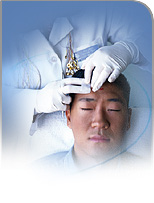 |
At the St. Rita's Sleep Disorders Lab, our staff of specialists works to diagnosis and treat breathing disorders of sleep. After a complete evaluation of your problem, specialists may recommend that you receive a sleep study, which may involve several hours, an overnight stay or a series of overnight stays.
The staff will continually monitor your stay, from an initial interview for a detailed description and history of your problem, to the recommendation of further testing and studies. Discovering the causes which create your disorder is essential to restoring your life to normal. At St. Rita's Sleep Disorders Lab, help is available, because understanding is the first step toward recovery.
- Sleep Apnea
- Oxygenation of Chronic Breathing Problems
- Excessive Snoring
Apnea means "not breathing". Accordingly, sleep apnea refers to not breathing during sleep. Airflow may stop only a few times or up to several hundred times during sleep, and yet many people have absolutely normal breathing patterns while awake. Each apnea episode usually varies between 10 and 30 seconds, while some continue for up to 90 seconds. The result is low oxygen levels or high carbon dioxide levels in the blood, causing reflexes to quickly awaken the individual allowing breathing to start again.
If untreated, severe sleep apnea can be dangerous. A lack of oxygen provided to major organs can cause serious damage over time and lead to chronic breathing problems, heart problems and high blood pressure. There are three major kinds of sleep apnea.
Central apnea occurs when the breathing muscles in the diaphragm and chest stop because the brain is not sending a strong message to breathe. It can occur due to neurological disorders in adults or lack of full brain development in infants.
Obstructive upper airway apnea results from a lack of airflow through the neck due to a block. It may result from excessive fatty tissue because of obesity, an improper opening of the pharynx, or tumor, or other disease condition.
Mixed apnea is a combination of both central and obstructive airway apnea.
Symptoms of sleep apnea can be chronic nasal congestion, excessive snoring, fatigue, high blood pressure, daytime sleepiness or poor job or school performance.
While at the St. Rita's Sleep Disorders Lab, several different tests might be performed. To learn more about each test and information about the Sleep Clinic specifically, please click on any of the links below:
St. Rita's Sleep Disorders Lab welcomes physician or self-referrals. A physician referral can be in writing or by phone and should be accompanied by a brief summary of your medical history including any current laboratory test results and a list of all medications being taken. The lab will then contact you to schedule an appointment in the clinic to be evaluated by the board certified sleep specialists, Dr. J. Godwin or Dr. S. Kuchipudi. Self referrals are also welcomed and will be evaluated by the Lab's Medical Director prior to any testing.
After testing, the physicians will interpret the results of your study and forward a final report to your referring physician. A follow-up visit will be scheduled at the Sleep Disorders Lab for review, and further treatment if needed will be discussed.
Studies at the St. Rita's Sleep Disorders Lab are accepted medical procedures and are, in most cases, covered by insurance. Because the extent of coverage varies among different insurance companies, it is recommended that you contact your representative for complete details.
|
 |

For More Information
(419) 226-9397 |
| Location: |
St. Rita's Sleep
Disorders Lab
915 W. Market Street
Suite A
Lima, Ohio 45801 |
| What is Sleep Apnea: |
| First described in 1965, sleep apnea is a breathing disorder characterized by brief interruptions of breathing during sleep. It owes its name to a Greek word, apnea, meaning "want of breath." |
| Testing: |
| Click here to learn more about any of the Sleep Disorders Lab Tests:
|
|

